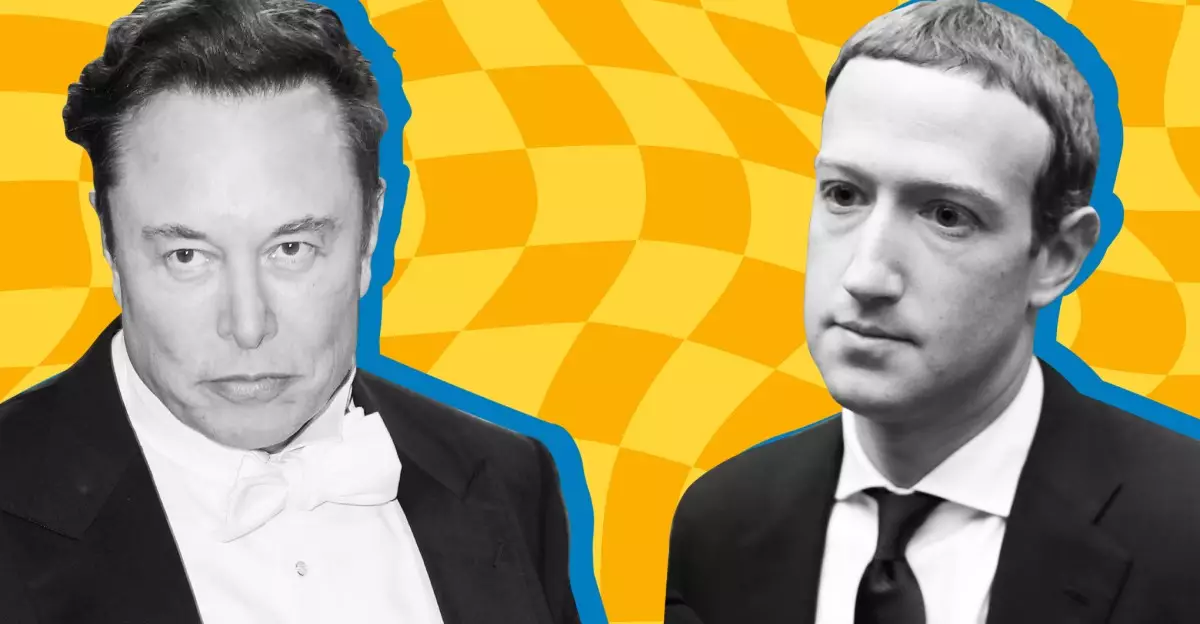In the vibrant heart of Silicon Valley, where innovation reigns supreme, reality has taken a bizarre twist with the emergence of AI-cloned voices. Recent instances in California, where crosswalk buttons have been manipulated to emit the voices of tech titans like Elon Musk and Mark Zuckerberg, reveal how technology can be twisted for comedic and even sinister purposes. Beyond the surface-level humor of these AI-generated antics lies a deeper commentary on the consequences of our increasing reliance on artificial intelligence.
This phenomena raises inevitable questions about identity, privacy, and the role technology plays in shaping public perception. When we encounter cloned voices of known figures, particularly those as influential as Musk and Zuckerberg, it is not merely a joke; it’s a reflection of how easily our reality can be distorted by technology. The notion that modern devices can spoof the voices of prominent public figures highlights a fundamental vulnerability of both our infrastructure and society.
A Hilarious Yet Startling Experiment
The onset of crosswalk buttons hilariously mimicking the voices of tech giants may invoke laughter at first, but beneath the surface, it’s a sobering reminder of how the lines between reality and artificiality are becoming increasingly blurred. To hear a simulated Musk humorously lament about loneliness or a fabricated Zuckerberg proudly proclaiming his company’s questionable achievements is both entertaining and unsettling. This juxtaposition of comedy and discomfort illustrates the complexity of current AI advancements—what appears amusing could also serve a more nefarious purpose.
Witnessing a fake Musk at a crosswalk beckoning pedestrians with his high-pitched pleas for companionship is an absurdity that showcases the limitless potential of AI-generated content. Creative? Yes. Hilarious? Certainly. But as we laugh at these faux declarations, it’s vital to recognize the societal implications. Near-simultaneous incidents in multiple cities, such as Palo Alto and Menlo Park, highlight an alarming trend—what starts as harmless pranks can evolve into a serious matter if misused, ultimately leading to misinformation and confusion.
Safety vs. Satire: A Significant Concern
One of the troubling aspects of these incidents is their potential impact on public safety. Crosswalk buttons are crucial for blind or visually impaired individuals, who rely on these auditory signals for safe navigation. Introducing AI-generated voices that spur laughter rather than clearly articulate safety instructions introduces an unnecessary distraction. The city officials themselves acknowledged this concern, promptly disabling those features. Yet, it begs the question: Does the allure of humor overshadow genuine safety?
Irrespective of the intent behind this act, the irreverence displayed rings alarm bells about the broader implications of AI technology. As we pursue the integration of AI into our daily lives, should we not contemplate the need for regulating its use? The popularity behind these AI spoofs could inspire further hacking attempts, leading to more serious disruptions in essential services, well beyond a few humorous soundbites.
A Reflection of Societal Values
The nature of the content produced by these AI-cloned voices also prompts us to reflect on what we—as a society—value. The humorous yet biting commentary delivered by simulated voices speaks volumes about our collective discontent with current technology and its implications. For Musk’s AI doppelganger to joke about his successes while expressing loneliness poignantly reflects the paradox faced by many in the tech industry. While these innovators achieve unprecedented success, they often grapple with existential doubts and social isolation.
Moreover, Zuckerberg’s faux comments about “undermining democracy” and “cooking our grandparents’ brains with AI slop” tap into a deep-seated frustration felt by many about the impacts of social media and artificial intelligence. These simulated musings reveal a profound skepticism regarding the future directions in which tech companies are steering society. The prank illustrates not just the absurdity of their personas but encapsulates unsettling truths—the hollow nature of digital connectivity and corporations’ disregard for ethical implications.
The New Frontier: What Lies Ahead?
As we navigate this new frontier of AI technology, the examples from California serve as both entertainment and cautionary tales. The convergence of humor and critique brings vital discussions to the forefront regarding identity, ethics, and responsibility in the age of artificial intelligence. The ability to spoof voices effortlessly lays bare the vulnerabilities in the systems we rely on. While we can engage with these narratives with laughter, we must also wield a more profound sense of responsibility as consumers and creators of technology.
The incidents of AI-cloned voices in crosswalks force us to confront uncomfortable questions: How do we define authority in an age where anything can be synthesized? What will the implications be on our trust in communication without tangible authenticity? As we move forward, we must challenge ourselves to think critically about how innovation shapes our reality and to remain vigilant in advocating for ethical practices within the realms of artificial intelligence and digital communication. The humorous interjections of cloned voices should not overshadow the call for a careful and conscious approach to technology’s integration into our lives.


Leave a Reply